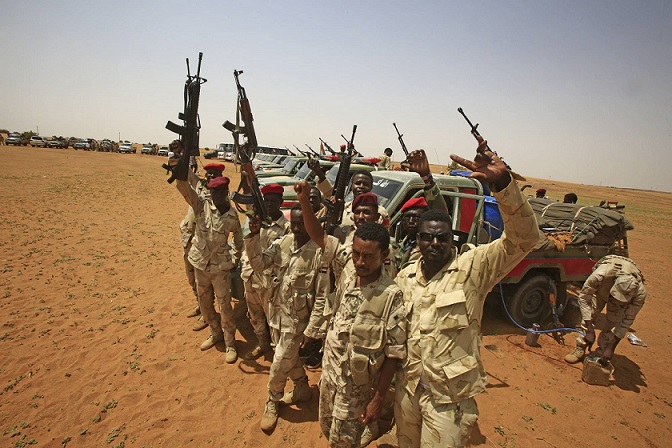What Does the End of the RSF’s Battle Against the Army Mean?

Report by: Fath Al-Rahman Shubairqa
The Chairman of the Advisory Council of the Rapid Support Forces (RSF), Huzayfa Abu Nuba, surprised Sudanese public opinion by announcing the end of the traditional military battle against the Sudanese army and the transition to a new phase aimed at establishing a “new Sudanese state.”
Military leaders who spoke to Al Jazeera Net stated that Abu Nuba’s announcement—coinciding with the Sudanese army’s complete control over Khartoum State on Wednesday—is an attempt to divert attention from the successive defeats suffered by the “militia.”
However, Imran Abdullah, advisor to RSF Commander Mohamed Hamdan Dagalo “Hemedti,” told Al Jazeera Net that Abu Nuba’s statement means that the war ended with the RSF’s victory and advancement across all battlefields.
No Retreat
Imran stated that “the essence of Abu Nuba’s message is that our battle now is one of awareness and the building of a modern state modeled after advanced countries, built on equality where merit—not gender or color—determines one’s position, unlike in the past.”
He pointed to what he described as broad popular support for the RSF and said that the alliance of political and military forces—led by the Sudan People’s Liberation Movement under Abdelaziz al-Hilu and other revolutionary movements—constitutes a victory for the people’s will and their dream of building a civil democratic state inclusive of all.
Imran stressed that Abu Nuba’s declaration of the end of traditional military combat against the army and the transition to a new phase does not at all mean the RSF is retreating.
Abu Nuba’s statement sparked varied reactions and interpretations, with some considering it a sign of significant political and military implications.
Risks of the Announcement
Military and strategic expert Brigadier General Jamal Al-Shaheed told Al Jazeera Net that the announcement implies the RSF has reached the conclusion that it can no longer rely on direct military victory.
He did not rule out the possibility that this signals a strategic shift toward a prolonged war of attrition based on administrative control, political networking, and destabilizing the army’s depth through unconventional strikes—as witnessed in Port Sudan, Merowe, Atbara, and Kosti.
He noted that this shift comes amid increased military pressure on the RSF in multiple regions, including Darfur and North Kordofan, as the army regains momentum in key operational areas.
Brigadier Al-Shaheed warned that the most dangerous aspect of Abu Nuba’s statement is its shift from a discourse of “victimhood and restoring democracy” to one of declaring an alternative political project. This project moves beyond the idea of power-sharing to a unilateral vision of a supposed new state, effectively signaling an attempt to create a parallel authority outside of a unified Sudanese state.
He added that this carries the risk of dragging the country into scenarios similar to Libya or Yemen, where militias replaced military tools with narratives of parallel legitimacy and sought to impose administrative and political realities on the ground.
Outcome of Defeat
Meanwhile, Al-Sadiq Adam Omar, acting head of the Popular Resistance Media Committee in Gezira State, central Sudan, said Abu Nuba’s statement is an attempt to “divert attention from the militia’s ongoing defeats.”
He told Al Jazeera Net that the defeats are now occurring in the very heartlands of their own support bases, whose residents were deceived by misleading statements portraying the militia as in control. The truth has now been exposed to their backers, especially as battles have moved into their neighborhoods and villages. “They misled their own people who betrayed the homeland,” he said.
Adam Omar downplayed any political influence the RSF may have, saying they have no presence on the ground and cannot coexist among civilians, let alone participate in ruling the country at any level.
He stressed that the decision on this matter belongs to the people, not the leadership, since the war is between the “militia” and the citizens. “Therefore, the citizen alone has the authority to decide whether the militia should participate in political life.”
Imposing a New Reality
Abu Nuba’s statement comes at a time when the war is undergoing undeclared battlefield shifts and a rise in international and regional initiatives to revive the peace process. Observers note a clear shift in the balance of power in favor of the Sudanese army.
Brigadier General Jamal Al-Shaheed said that Abu Nuba’s talk of ending the military battle is a preemptive move to impose a new negotiating reality—or a veiled secessionist declaration aimed at positioning the RSF as an established authority rather than a rebel militia.
He noted that the statement marks a significant development in the political discourse of the RSF and opens the door to concerning possibilities regarding Sudan’s unity and regional stability. It signals a transition of the battle from the battlefield to the realm of legitimacy.
He emphasized that this development requires comprehensive national awareness and clear consensus between the military institution and civilian forces around a unified national project to block separatist ambitions and foreign interventions.
Source: Al Jazeera Net



